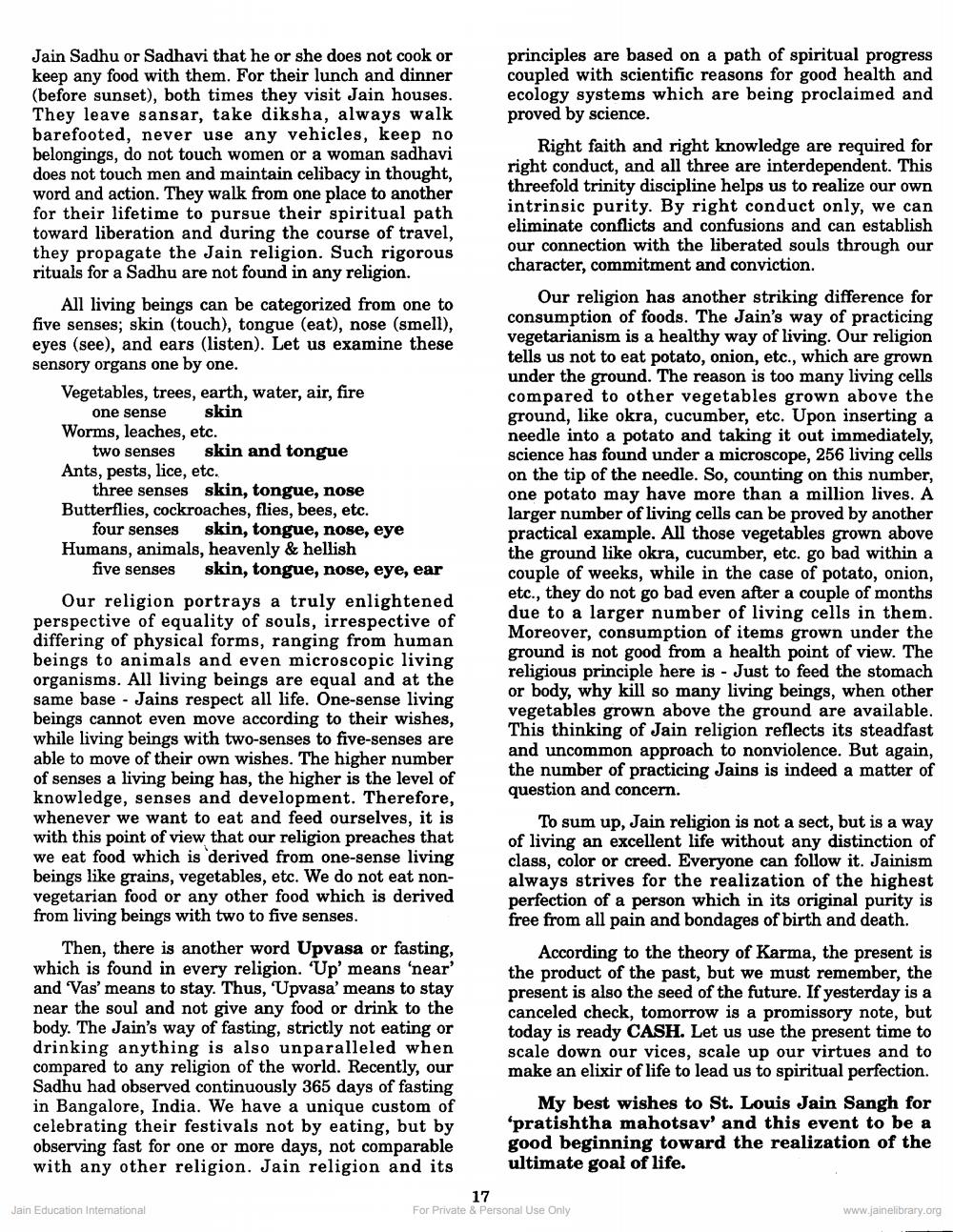________________
Jain Sadhu or Sadhavi that he or she does not cook or keep any food with them. For their lunch and dinner (before sunset), both times they visit Jain houses. They leave sansar, take diksha, always walk barefooted, never use any vehicles, keep no belongings, do not touch women or a woman sadhavi does not touch men and maintain celibacy in thought, word and action. They walk from one place to another for their lifetime to pursue their spiritual path toward liberation and during the course of travel, they propagate the Jain religion. Such rigorous rituals for a Sadhu are not found in any religion.
All living beings can be categorized from one to five senses; skin (touch), tongue (eat), nose (smell), eyes (see), and ears (listen). Let us examine these sensory organs one by one.
Vegetables, trees, earth, water, air, fire skin
one sense
Worms, leaches, etc.
two senses Ants, pests, lice, etc.
three senses skin, tongue, nose Butterflies, cockroaches, flies, bees, etc.
skin and tongue
four senses skin, tongue, nose, eye Humans, animals, heavenly & hellish skin, tongue, nose, eye, ear
five senses
Our religion portrays a truly enlightened perspective of equality of souls, irrespective of differing of physical forms, ranging from human beings to animals and even microscopic living organisms. All living beings are equal and at the same base Jains respect all life. One-sense living beings cannot even move according to their wishes, while living beings with two-senses to five-senses are able to move of their own wishes. The higher number of senses a living being has, the higher is the level of knowledge, senses and development. Therefore, whenever we want to eat and feed ourselves, it is with this point of view that our religion preaches that we eat food which is derived from one-sense living beings like grains, vegetables, etc. We do not eat nonvegetarian food or any other food which is derived from living beings with two to five senses.
Then, there is another word Upvasa or fasting, which is found in every religion. 'Up' means 'near' and 'Vas' means to stay. Thus, Upvasa' means to stay near the soul and not give any food or drink to the body. The Jain's way of fasting, strictly not eating or drinking anything is also unparalleled when compared to any religion of the world. Recently, our Sadhu had observed continuously 365 days of fasting in Bangalore, India. We have a unique custom of celebrating their festivals not by eating, but by observing fast for one or more days, not comparable with any other religion. Jain religion and its
Jain Education International
principles are based on a path of spiritual progress coupled with scientific reasons for good health and ecology systems which are being proclaimed and proved by science.
Right faith and right knowledge are required for right conduct, and all three are interdependent. This threefold trinity discipline helps us to realize our own intrinsic purity. By right conduct only, we can eliminate conflicts and confusions and can establish our connection with the liberated souls through our character, commitment and conviction.
Our religion has another striking difference for consumption of foods. The Jain's way of practicing vegetarianism is a healthy way of living. Our religion tells us not to eat potato, onion, etc., which are grown under the ground. The reason is too many living cells compared to other vegetables grown above the ground, like okra, cucumber, etc. Upon inserting a needle into a potato and taking it out immediately, science has found under a microscope, 256 living cells on the tip of the needle. So, counting on this number, one potato may have more than a million lives. A larger number of living cells can be proved by another practical example. All those vegetables grown above the ground like okra, cucumber, etc. go bad within a couple of weeks, while in the case of potato, onion, etc., they do not go bad even after a couple of months due to a larger number of living cells in them. Moreover, consumption of items grown under the ground is not good from a health point of view. The religious principle here is - Just to feed the stomach or body, why kill so many living beings, when other vegetables grown above the ground are available. This thinking of Jain religion reflects its steadfast and uncommon approach to nonviolence. But again, the number of practicing Jains is indeed a matter of question and concern.
To sum up, Jain religion is not a sect, but is a way of living an excellent life without any distinction of class, color or creed. Everyone can follow it. Jainism always strives for the realization of the highest perfection of a person which in its original purity is free from all pain and bondages of birth and death.
According to the theory of Karma, the present is the product of the past, but we must remember, the present is also the seed of the future. If yesterday is a canceled check, tomorrow is a promissory note, but today is ready CASH. Let us use the present time to scale down our vices, scale up our virtues and to make an elixir of life to lead us to spiritual perfection.
My best wishes to St. Louis Jain Sangh for 'pratishtha mahotsav' and this event to be a good beginning toward the realization of the ultimate goal of life.
17
For Private & Personal Use Only
www.jainelibrary.org




